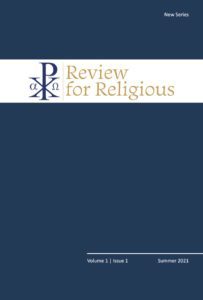We invite you to preview Review for Religious 1, no. 2 (Fall 2021)!
The second print issue of the Review for Religious, our special issue on faith, science, and religious life, mails in early November. It features:
- contributions from men and women religious as well as lay experts
- articles on faith and reason, teaching science, and the new cosmology
- book reviews, CARA Notes, and an editorial introduction to our first themed issue!
You may preview the issue by downloading the table of contents and by reading excerpts below.
Excerpts From the Themed Issue
Is there something unique that the Catholic intellectual tradition brings to the study of science, and should it make a difference to teach and learn science in a Catholic school? In other words, what are the distinctive aspects, both of content and approach, which Catholic schools and universities can contribute to the study of science and to its integration, not only within the Catholic intellectual tradition, but also within the cultural milieu?
Given the many other lines of scientific reasoning that converge on the same conclusion that evolutionary theory best accounts for the origin and development of life on earth, I submit that the question for Christian evangelists and educators today ought not to be how we can defend the faithful against the advances of this
science but rather how we engage in dialogue with it so as to more deeply penetrate the mysteries of the Christian faith and, in turn, illumine the science with our faith.
In this article, I am going to present some of my own thoughts on science-faith catechesis and apologetics. I will first lay out some general principles that I think should guide such efforts and then I will discuss some specific ideas, arguments, and facts I think it most essential to communicate to people wrestling with science-faith questions.
The dominance of scientific knowledge is acute. This suggests that those with pastoral, teaching, and preaching responsibilities need to have the tools to explain to puzzled, confused, or genuinely curious parishioners and anyone interested in the Catholic faith just how science and religion fit together, why science is not displacing religion, and indeed why science itself is ultimately rooted in religious convictions.
Developments in science, evolutionary theory, and cosmology have provided new lenses through which to view and understand their religious vocation in a 21st century context. This becomes especially important since “Christian theology no longer has an effective cosmology that enables believers to relate to the world in its physical character in a way that is consistent with their religious symbols.” Addressing that need, the New Cosmology integrates scientific facts, including discoveries about the expanding universe and evolution, and proposes that creation is on-going and evolving into greater complexity.
Ratzinger formulates a way of discerning just how far the Bible’s claim to truth extends by “tinkering” with two givens at the same time. He “tweaks” the textbook theology of Scripture with an eye to reason, and he challenges the narrowness of scientific reason with an eye to faith.
